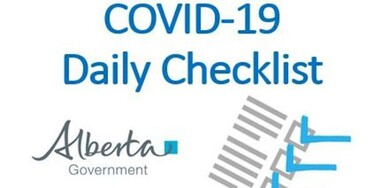
Alberta Health Services updated its 'Daily Symptoms Checklist' by breaking it into two: the first for those under 18 years of age, and the second for those over 18 years of age.
Updates to the daily checklist for students will take effect on Monday, November 2.
- This also applies to individuals who are 18 and over and are attending high school.
- All other Albertans who are 18 and over, including school staff, will continue to use the Alberta Health daily checklist that was previously posted online.
- Both checklists are available here (Page 1 & 2 for students, and page 3 for adults)
- Symptoms of runny nose and sore throat have been removed from the mandatory isolation checklist for Albertans under 18.
- The core isolation symptoms for children are now one (or more) of the following: cough, fever, loss of taste or smell and shortness of breath. If a child has any of these core symptoms, they are to isolate for 10 days OR have a negative COVID-19 test result and feel better before they return to school or other activities.
- If a child has one of the following symptoms: chills; sore throat or painful swallowing; runny nose or congestion; feeling unwell or fatigue; nausea, vomiting, diarrhea; unexplained loss of appetite; muscle or joint aches; headache; or conjunctivitis (pink eye):
- The child should stay home and monitor for 24 hours.
- If their symptom is improving after 24 hours, they can return to school/activities when they feel well enough to attend. Testing is not recommended.
- If the symptom worsens after 24 hours, or if additional symptoms emerge, or if the child has any two symptoms from this second list, they are to continue to stay home, and testing is recommended but not required. The child can return to activities and school when their symptoms have resolved AND it has been 24 hours or more since their symptoms started.
These changes in the daily checklist will help ensure a focus on testing, decreased wait times and get Albertans who are under 18 years of age back into the classroom and participating in activities as quickly and safely as possible, while minimizing the risk of COVID-19 transmission.
Back to News






